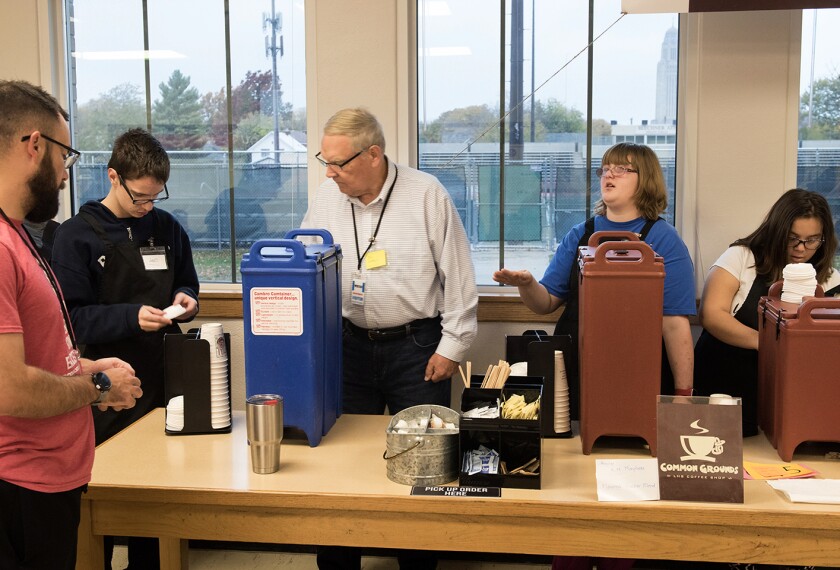In a poem, Gloria L. Clark once wrote that dyslexia is like loving a guy who doesn’t love you back—and his name is “Word.”
Despite her difficulty deciphering words, the recent high school graduate from Decatur, Ga., says writing poetry and short stories has helped her express what it feels like to deal with dyslexia, the most common disorder in the broad category of “specific learning disabilities.”
Gloria, 18, has two published books of poetry and gives motivational speeches to young children so others with dyslexia will know they are not alone.
“Not a lot of kids are open with their disabilities,” said Gloria, who hopes her confidence will make it easier for others to advocate for themselves. “I don’t hide it.”
It hasn’t always been easy for Gloria to talk about her dyslexia, a condition of the brain that makes it hard for a person to read, write, and spell. When she was first diagnosed in elementary school, Gloria said she felt like the disorder was an incurable disease and didn’t tell her friends why she came early or stayed late to get extra help.
Then, the summer before middle school, Gloria’s parents, Christopher and Jenell Clark, posted a list and photos of famous people with dyslexia, including Tom Cruise and Steve Jobs, on the wall in her room.
“They said: ‘This is why you are going to be amazing,’ ” recalled Gloria. “That’s when I became a little more open and became a little more swag with myself. I learned how to cope.”
Becoming an advocate
By 7th grade, Gloria was leading her individualized education program meetings and giving 15-minute PowerPoint presentations. “It’s about me. Nobody knows any more about me than me,” she said.
Her mother said she was impressed. “She’s a natural extrovert—that’s part of her gift,” said Ms. Clark.
To accommodate her dyslexia, Gloria gets extra time, has a reader, and gets notes taken for her in school. At home after track practice, she starts working around 6 or 7 p.m., rewriting her notes to reinforce lessons, making flashcards, and sometimes studying until 2 a.m. for a quiz.
We take a look at how six students with disabilities are planning their transition to college and the workforce:
Gloria has a 3.3 grade point average at Decatur High School and just finished an Advanced Placement psychology class to get a feel for college-level work and to prove to doubters that she could do it.
While Gloria knew she could excel in college, she was turned down by her first-choice schools.
“It was hard to accept that most colleges didn’t understand me. I’m so good at speaking up for myself, standing in front of a crowd and saying, ‘This is who I am.’ But for somebody to judge me off of a piece of paper and test scores … . I’m average,” she says. “But if you have a conversation with me, I can tell you I’m a great fit for your college.”
Gloria discovered the 3,000-student Brenau University while tagging along with a friend on a visit to the Gainesville, Ga., school. A 1,000-student women’s college is a cornerstone of the university.
She met an administrator who called her the next day, asking Gloria to enroll. “I said, ‘You saw my GPA and my test scores and you still want me?’ Wow,” she recalled. “It was pretty amazing.”
Gloria will attend Brenau this year with financial support from the Georgia State Vocational Rehabilitation Agency and possibly a track scholarship. Although she’s nervous, Gloria said the transition to college will be smooth because she has experience with hardship. “I’ve never had it easy in school, so I know how to fight,” she said.
Ms. Clark is not worried, either: “I have no hesitation. She knows how to ask for what she wants. If not, she knows how to go through the proper chain of command.”
Gloria said she thinks the small classes at Brenau will make it easier for her to talk with her professors about accommodations. To get a jump-start, she is going to summer school starting in July. “It will give me one-on-one time to meet with my teachers,” she said. “I will get settled in, have my room set up, and by the time everyone else gets there, … I’ll be able to chill.”
Gloria hopes college will be a chance to become a powerful advocate for people with disabilities, possibly as a civil rights lawyer, and someday change the college-admissions process to focus on people’s strengths. “I can’t be Superman. I have to have a community behind me to help me,” she said, acknowledging her family, counselors, and teachers who have supported her to this point. But she is ready to advocate on her own and for the next chapter of her life at college to begin. “I’m excited to find what I’m good at,” she said, “and start my life and to get it going.”





